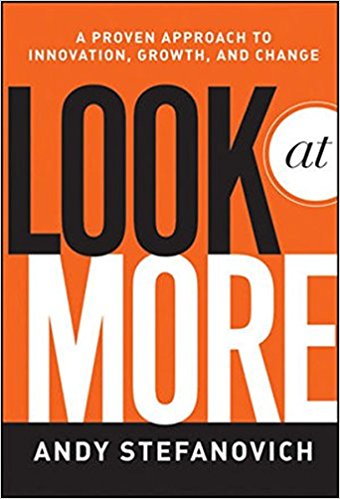Look at More Summary

4 min read ⌚
 A Proven Approach to Innovation, Growth, and Change
A Proven Approach to Innovation, Growth, and Change
Whatever you do, whatever change or transformation you want to achieve you need to get the proper inspiration. Inspiration is the root of any innovation. To inspire your staff members, you need to motivate them to think in a unique manner, which rarely (if ever) occurs by itself.
Who Should Read “Look at More”? And Why?
Andy argues that to come up with a genuinely creative idea, you should brainstorm outside of the box in which you brainstormed until now.
He explains how companies can motivate their employees to tune in to the channel of inspiration, and become more productive and creative. In the course of the past 20 years, the reputation for being a disruptive advisor (in a right way) follows Stefanovich.
He advised his customers to evade conventional thinking, cliched answers, and typical activities. He demands that they think in an uncommon and fresh way. Coca-Cola, Nike, Procter and Gamble, GE and other legendary corporations take after his wonderful, inventive suggestions.
We recommend this book to readers who want to know how to innovate – the best way to learn is learning from the best.
About Andy Stefanovich
 Andy Stefanovich works at Prophet – marketing, innovation, branding, and design-oriented firm, and teaches at Dartmouth, Duke, as well as other prestigious universities.
Andy Stefanovich works at Prophet – marketing, innovation, branding, and design-oriented firm, and teaches at Dartmouth, Duke, as well as other prestigious universities.
“Look at More Summary”
To make innovation a practice, your company must systematize it, or, in other words, approach it similarly to other business activities. You can do this by adopting and utilizing the LAMSTAIH equation, which is an acronym for “Look At More Stuff; Think About It Harder.”
Most organizations do routinely meet with their advancement teams to attempt to create an innovation culture in their associations. However, regardless of such accentuation on development and innovation, most firms are not exceptionally creative.
Why is that? Well, when it comes to innovation, most companies stress output more than the input. Thus they practically don’t try to make innovation conceivable. Instead, they anticipate that it will grow just like that, without any particular effort.
In reality, to be inventive, your organization must encourage itself and urge its workers to go after unique experiences and fresh insights. Although you cannot force creativity, you can make sure that the setting and mood in your company is right for brainstorming, creative contemplation, and new ideas.
You can do this by utilizing LAMSTAIH and its five primary drivers, the five “Ms”:
First, the “mood” for what you try to achieve is either right or wrong. You will intuitively know the right mood when you encounter it. Executives incline using sterile, dormant rooms as crucial places where they ask employees to be imaginative.
However, you cannot develop and innovate in a sterile space. Get out of the conference rooms and turn your group’s flow upside down. Another helpful strategy for changing the mood is to make provocative inquiries.
A third way is altering the physical environment – removing employees from their typical physical environment encourages them to gain fresh insights.
The second M stands for “Mindset.” To be innovative, you have to adopt the innovative mindset. You can “enter” this mindset by using the four specific “thinking disciplines,” which are bound to make you more open to creativity.
- The first discipline is switching your perspective.
- The second one is taking more risks.
- The third one is finding your passion.
- The fourth one is welcoming uncertain circumstances and abstaining from forecasting the future.
Furthermore, to transform inspiration into an intentional act, you need to assemble the “mechanisms” and surrounding in which you can create. Develop a concrete system to dispatch your thoughts into action.
To find a solution for an issue by empowering new ideas, first make a complete rundown of the issue’s most significant physical and functional attributes. Utilize this record to brainstorm.
Next, evaluate and filter your thoughts by looking into conventional parameters such as advertising or finances. In the end, create an execution plan for your design.
Stay imaginative when developing a “measurement” system for following up on innovation and idea development.
To quantify an association’s mood and atmosphere, take note of your employees’ behavior. To quantify mindset, ask about the number of projects flops each quarter. In order to gauge momentum, search for record keeping that captures good circumstances.
Finally, breathing room keeps “momentum” going. To stay productive, your workers need the time and space to recharge.
Key Lessons from “Look at More”
1. Inspiration by Delight
2. Inspiration by Design
3. Inspiration on Demand
Inspiration by delight
Unexpected, pleasant situations incite motivation and inspiration.
Such creative lightning can strike you when all of a sudden a scene, smell, a feeling catch your attention and seem compelling. Make sure that you stay aware of those moments, and don’t let them pass unnoticed.
Inspiration by design
Maybe sometimes you will indeed find inspiration if you make an extra effort, like going to a museum or taking an exciting class.
However, many times you will find inspiration in unplanned spots where the vast majority of people would never look for it.
Inspiration on demand
On the off chance that you feel that you need an ongoing dose of inspiration to continue onward, increase your mindfulness about your environment.
Everything can be an object that will light your inspiration flames. Stay aware.
Like this summary? We’d Like to invite you to download our free 12 min app, for more amazing summaries and audiobooks.
“Look at More” Quotes
Inspiration is taking the time to ask an individual...What really engages your mind to such a level that you start to pursue it, that you start to leverage that curiosity and tap into your passion? Share on X Words and language can transform expectations and change the mood in any organization. Share on X Because they’re overly reliant on familiar tools, individuals in an organization tend to propose the same type of solution to every problem they encounter. Share on X The actions we repeat over and over while we work become rituals. And these rituals are either in service of or in opposition to inspiration and creativity. Share on X To find the unexpected, you have to be open to it – wherever and whenever it appears. Share on XOur Critical Review
“Look at More” is a captivating book on innovation, creation, and advancement. Andy Stefanovich, who practices the innovation mindset in Prophet, marketing, design, and branding firm, has written it to share his view on how inspiration can be cultivated in a company.








